Unlocking Durability and Style: The Top Advantages of PVC Roofing Systems
Why opt for PVC roofing? With unmatched durability, environmental benefits, and design flexibility, PVC roofing stands out as a smart choice for those seeking a long-term solution for commercial and residential buildings. Learn the ins and outs and why it might be the best fit for your project.
Key Takeaways
- PVC roofing systems offer durability, energy efficiency, and versatility, suitable for various architectural styles and functional requirements in residential, commercial, and institutional structures.
- Advantages of PVC roofing include a long lifespan, robust resistance to weather and fire, low maintenance needs, and the ability to reflect sunlight and reduce heat absorption, which contributes to energy conservation and cost savings.
- The success of PVC roofing is highly dependent on professional installation, with the expertise of the contractor playing a crucial role in avoiding potential problems and ensuring long-term performance and structural integrity.
The Essentials of PVC Roofing Systems
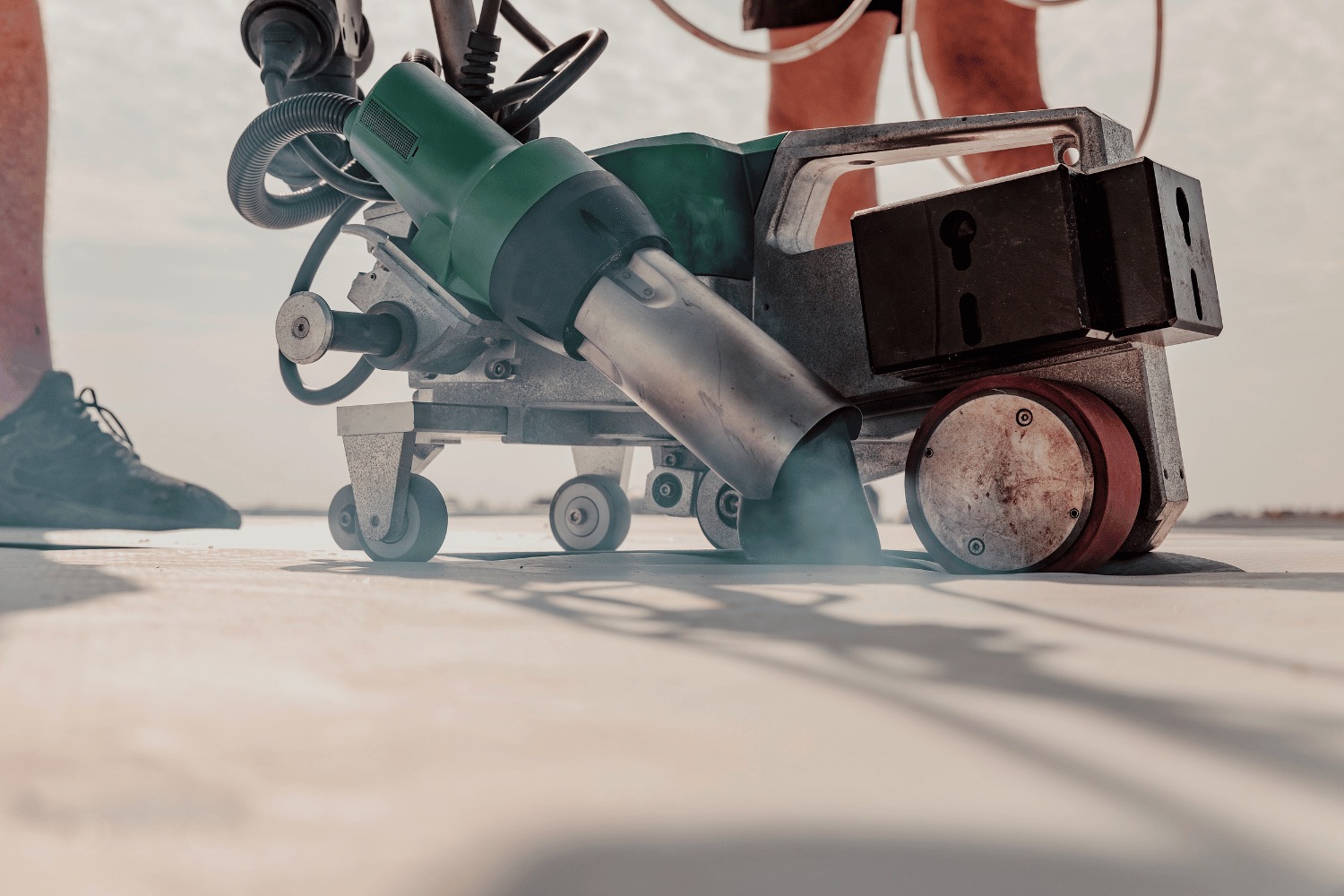
Illustration of PVC roofing systems
PVC roofing systems have carved a niche in the roofing industry, offering a combination of durability, versatility, and a long history of performance. Recognized by professionals as a stalwart among roofing materials, PVC—or pvc polyvinyl chloride—boasts a composition that includes chlorine from industrial-grade salt and ethylene from natural gas, making it a reliable choice for any roofing project. With over six decades of use, PVC roofing membranes have established themselves as a durable solution in the market, evolving through rigorous testing and technological advancements.
When considering a PVC roofing system, factors like initial costs, temperature sensitivity, and long-term benefits play pivotal roles in the decision-making process. The material quality of PVC not only affects the roof’s durability but also its appearance, ensuring that a PVC roof meets both functional and aesthetic demands. Whether it’s a flat roof for a commercial building or a residential roof looking for a modern touch, PVC roofing membranes stand out as a prime choice, blending structural integrity with style.
The Composition of PVC Membranes
At the heart of every PVC roofing system lies the PVC membrane, a marvel of modern engineering designed for strength and flexibility. The standard PVC membrane is crafted by blending PVC with various additives that enhance its durability and performance. At its core is a polyester reinforcement layer, crucial for providing the necessary tensile strength a roof needs to withstand the elements. This blend also includes a significant proportion of chlorine, sourced from common salt, which not only contributes to the membrane’s robustness but also helps reduce its carbon footprint during production, a clear advantage over other plastics reliant on petroleum.
PVC membranes’ composition is a testament to the roofing industry’s commitment to innovation and environmental stewardship. By incorporating materials that enhance the membrane’s flexibility and longevity, PVC roofing membranes have emerged as a superior choice for those seeking a roofing material that balances performance with ecological consideration. It’s a combination that positions PVC as a front-runner in the evolution of roofing solutions.
Types of PVC Roofing Solutions
Navigating the landscape of PVC roofing solutions, one encounters a variety of options designed to meet diverse needs and preferences. Standard PVC membranes lead the charge with their cost-effectiveness and resilience against harsh weather conditions, making them a go-to for many roofing projects. For those seeking additional benefits, fleece-backed PVC products emerge as a favorable option, cutting down on labor costs and offering flexibility in installation methods, which is particularly advantageous for complex roof landscapes.
For the discerning property owner, specialized PVC KEE (Ketone Ethylene Ester) membranes represent the pinnacle of PVC roofing technology. These advanced membranes boast increased long-term performance and stability, setting a new benchmark in the roofing industry for durability and reliability. Whether it’s the standard, fleece-backed, or KEE membrane, PVC roofing solutions provide the versatility to cater to the specific demands of any roofing project, ensuring that every building is protected and stylishly so.
Unveiling the Benefits of a PVC Roof
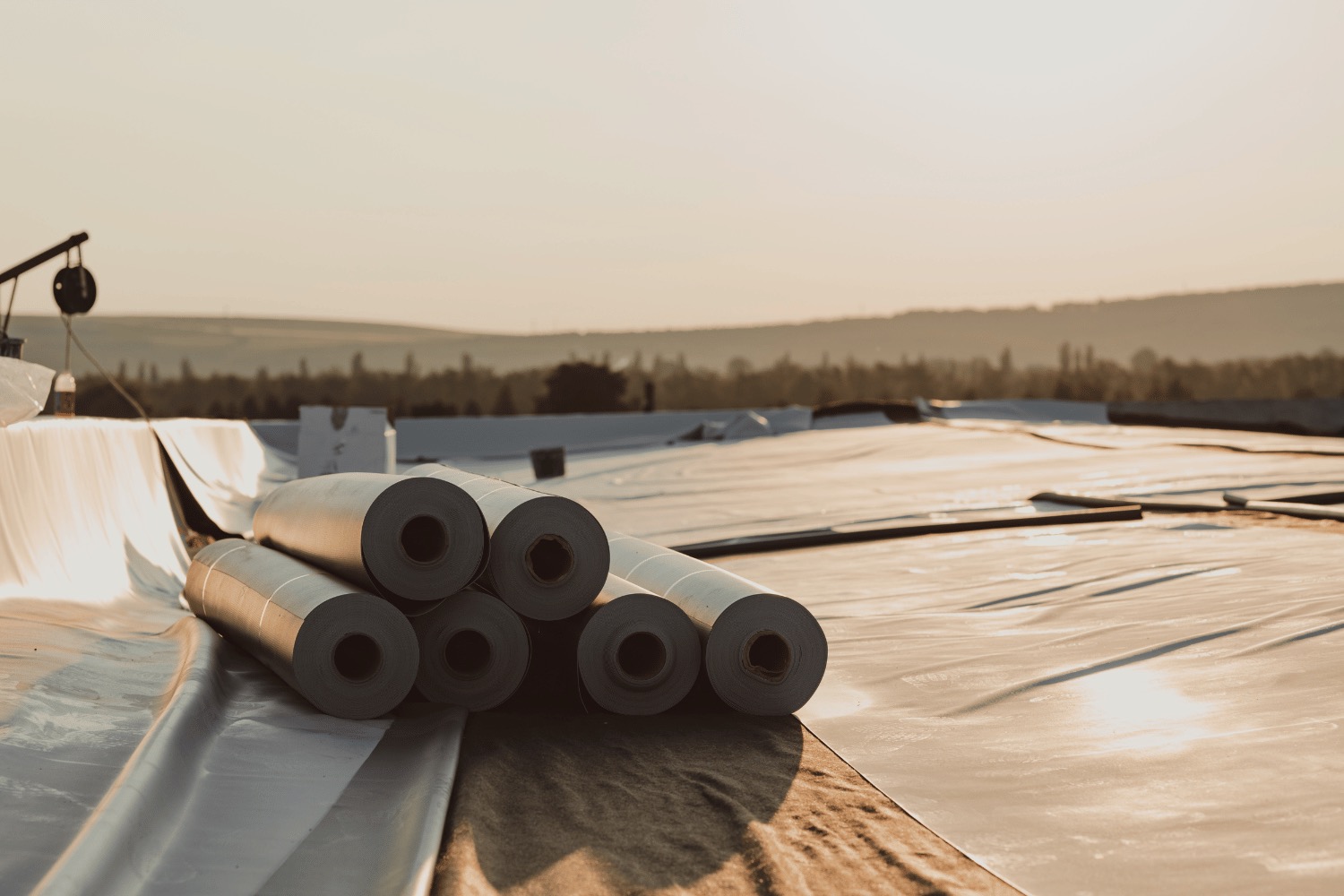
Illustration of energy-efficient PVC roofing
The allure of PVC roofing systems isn’t just skin deep; beneath the surface lies a suite of benefits that make them an attractive proposition for any building owner or contractor. With a lifespan that can extend up to three decades, PVC roofing is not just incredibly durable; it’s also a cost-effective option over the long term, thanks to its low maintenance requirements. Its intrinsic waterproof properties and heat-welded seams provide unmatched protection against leaks, which is especially valuable in areas subject to severe weather conditions.
Moreover, PVC roofing materials boast the following advantages:
- Lightweight characteristics that facilitate ease of installation, often without the need for additional structural support
- A variety of color options, offering aesthetic flexibility to meet even the most particular of design requirements
- Energy efficiency, resistance to elements, and low maintenance
These benefits make PVC roofing a highly sought-after choice in the roofing realm.
Energy Efficiency: A Cooler Roof Option
In the quest for greener building practices, PVC roofs emerge as champions of energy efficiency. Endorsed with Energy Star and Cool Roof ratings, these roofing systems excel in reflecting sunlight, significantly reducing heat absorption and leading to a cooler building interior. This high reflectivity not only keeps indoor spaces more comfortable but also translates to tangible cost savings by lessening the reliance on air conditioning systems, particularly during the sweltering summer months.
The insulation qualities of PVC roofing offer several benefits, including:
- Minimizing heat loss and maintaining a consistent indoor temperature year-round
- Energy conservation, particularly during colder seasons
- Case studies showcasing PVC roofing’s ability to conserve energy and maintain indoor comfort across varying climate conditions
These benefits solidify PVC roofing’s reputation as an energy-efficient solution.
Resistance to the Elements: PVC’s Weather-Resilient Nature
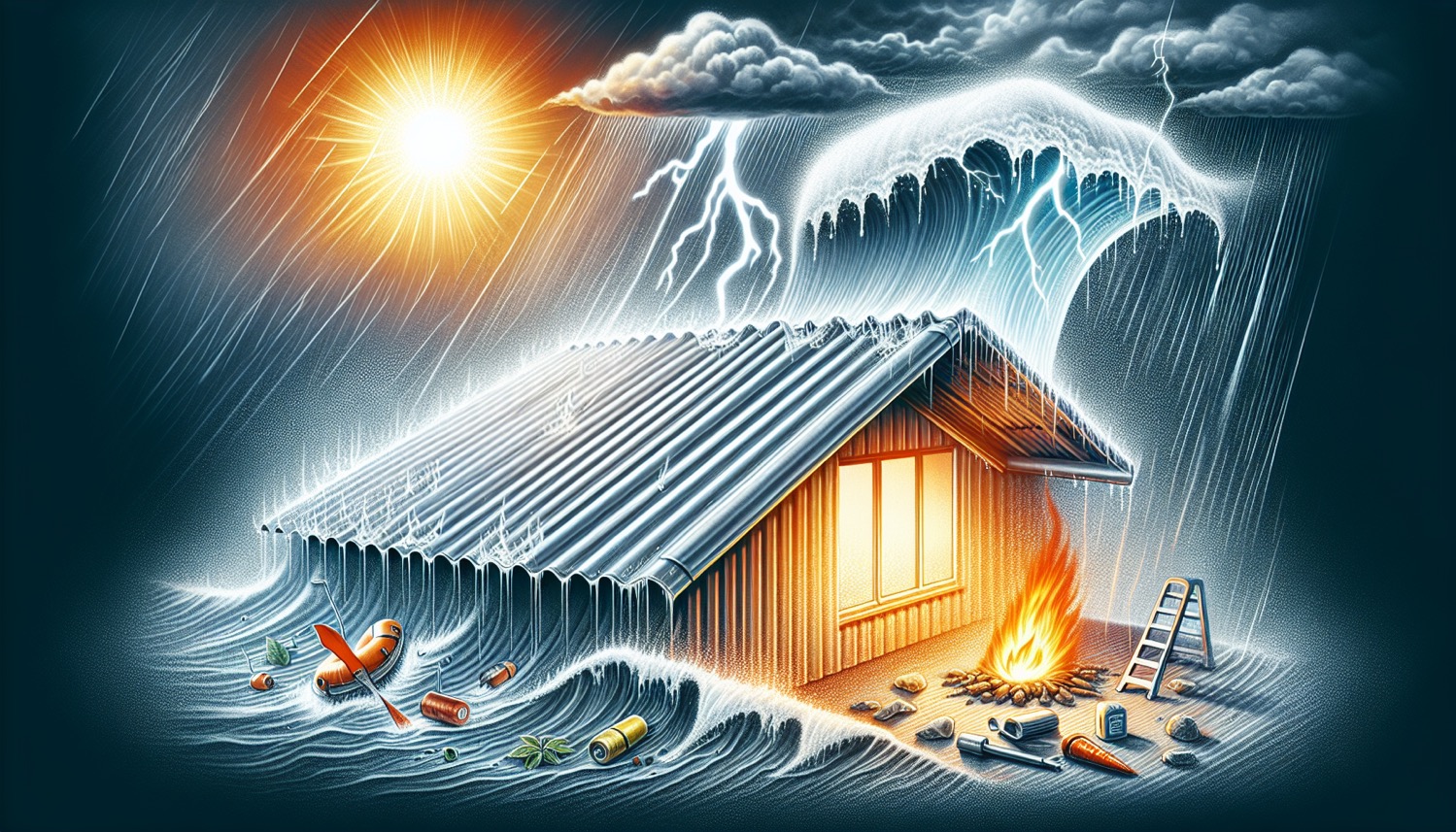
Illustration of PVC roofing’s weather resilience
PVC roofing systems are built to last, engineered to withstand the fury of nature’s elements. With a breaking strength that exceeds ASTM requirements, PVC roofs show little to no damage even when pitted against high winds and hail, showcasing their superior resistance. The robustness of PVC also extends to its ability to resist UV damage, ensuring that the roof’s color and structural integrity remain intact over time.
Furthermore, PVC’s resistance to fire is a noteworthy feature. The material’s self-extinguishing properties mean that in the event of a fire, the flames will die out once the source is removed, offering peace of mind to property owners. Additionally, PVC roofing’s chemical resistance is a formidable defense against a broad spectrum of elements, debunking the misconception that it may degrade quickly when exposed to harsh substances.
Low Maintenance: Ease of Upkeep with PVC Roofs
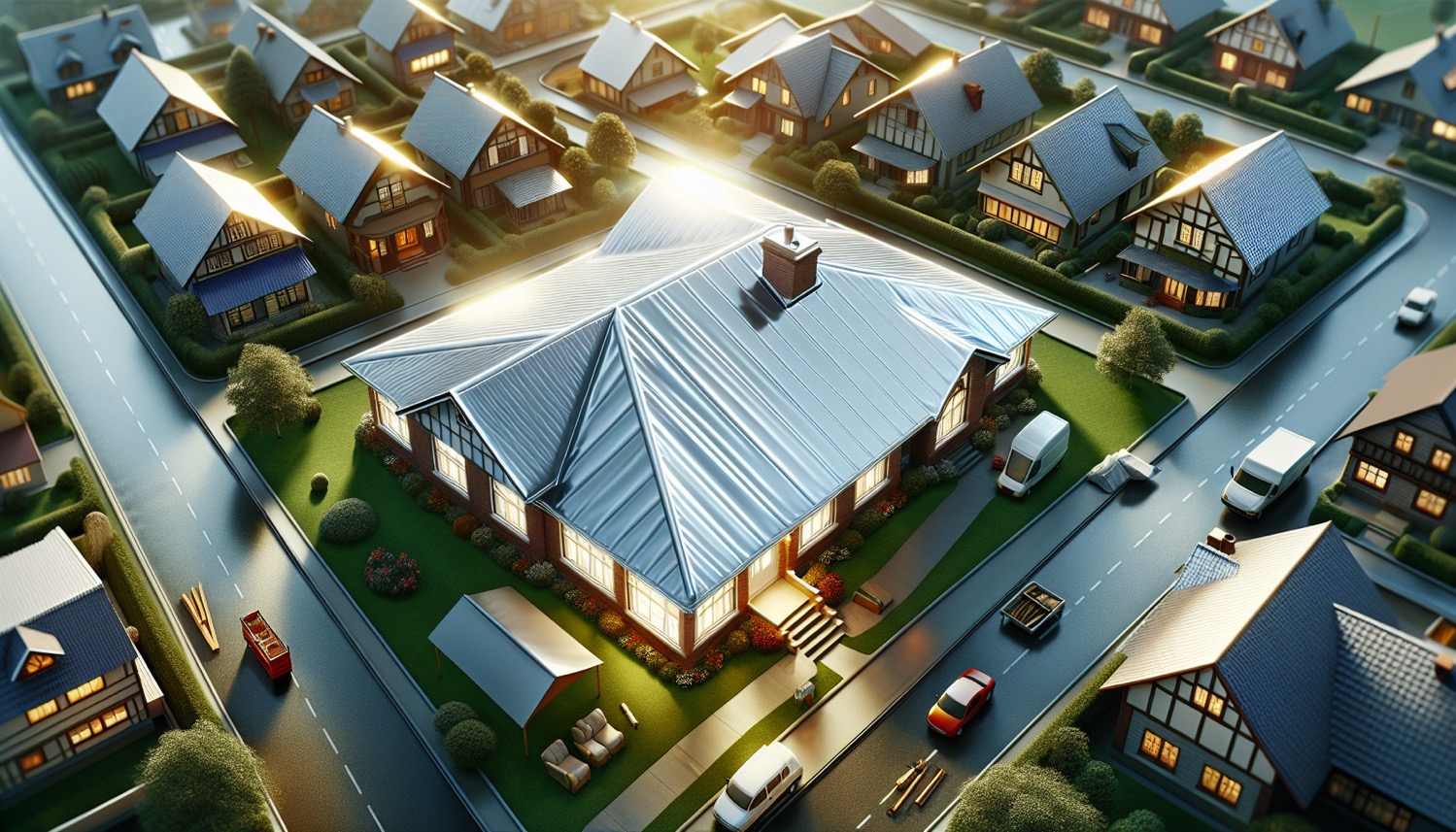
Illustration of low maintenance PVC roofs
The charm of a PVC roof extends beyond its robustness and into the realm of practicality, with minimal maintenance being one of its most appealing attributes. Over the lifespan of a PVC roofing system, property owners can anticipate very little upkeep, translating into significant savings and convenience. Routine inspections, occasional cleaning, and prompt repairs of any punctures or tears are all that’s required to maintain the pristine condition of a PVC roof.
This low maintenance profile makes PVC an ideal roofing material for commercial buildings, where heavy foot traffic is the norm. From shopping centers to restaurants and office complexes, PVC roofs offer a practical and reliable covering that can endure the rigors of day-to-day operations. However, it’s important to note that while maintenance is typically low, immediate attention to issues like water pooling is crucial to preserving the roof’s integrity and performance.
Addressing Common Misconceptions and Concerns
As with any popular building material, PVC roofing systems are not immune to misconceptions and concerns that can cloud a property owner’s judgment. It’s crucial to explore these potential weaknesses and drawbacks, such as repairability and environmental impact, to make an informed decision about your roofing material. While PVC roofing is lauded for its many strengths, it is not without issues that, if not promptly addressed, could turn into long-term problems.
One of the greatest assets of PVC roofing is its chemical resistance, which counters the belief that it may easily degrade when in contact with harsh chemicals. However, roof shrinkage is a valid concern when PVC roofing systems are subjected to extreme temperature changes, and addressing this is essential to maintain roof integrity.
Debunking Myths About PVC Roofing
The narrative that PVC roofing is difficult to maintain due to repair challenges is one that deserves to be corrected. PVC roofing systems are intentionally designed for ease of repair, which is a significant factor in their overall longevity. The process of re-welding is a straightforward yet effective method for fixing PVC roofing, giving it an edge over other roofing membranes that may require more elaborate repair strategies.
This ease of repair is not merely theoretical; companies like RoofCrafters have been successfully implementing PVC roofing in a variety of projects for nearly three decades, demonstrating the material’s durability and dependability over time. This long-standing track record of performance challenges the myths and reaffirms the reasons why PVC continues to be a preferred roofing choice.
Tackling Environmental Questions
Environmental sustainability is a pressing concern in today’s world, and PVC roofing systems address this by being recyclable, thus contributing to a reduction in landfill waste. Some manufacturers have even initiated recycling programs specifically for PVC roofing, showing a commitment to minimizing the environmental footprint of their products. When it comes to the safe disposal of PVC, efficient combustion can break it down into mostly harmless byproducts such as water, carbon dioxide, and hydrogen chloride, which minimizes the production of harmful dioxins.
The misconception that PVC contributes significantly to dioxin production in the environment has been debunked, with studies indicating that the majority of environmental dioxin is due to landfill fires and not PVC itself. This revelation is supported by the mapping of high dioxin concentrations corresponding to areas affected by open waste burning, rather than those with widespread PVC use.
Comparing PVC to Other Roofing Options
When stacked against other roofing materials, PVC roofing systems showcase their superior qualities, outperforming options like TPO and traditional materials across several metrics. Some of the advantages of PVC roofing systems include:
- Durability
- Energy efficiency
- Resistance to elements
- Fire-resistant properties
These qualities make PVC a compelling choice for those in the market for a new roof, especially in regions with strict fire codes where the fire-resistant properties of PVC offer an extra layer of protection.
PVC roofs offer several advantages over traditional roofing materials:
- Chemical resistance, making them ideal for areas with regular chemical exposures
- Ability to withstand ponding water, a common problem for other roofing materials
- Longer lifespan and less frequent replacement compared to asphalt shingles
- Better energy efficiency and quieter performance during rain and hail
- Suitable for both commercial and residential applications
PVC vs. TPO: A Side-by-Side Comparison
Delving into the specifics, a side-by-side comparison of PVC and TPO roofing systems reveals key differences that could influence a property owner’s choice. PVC roofing consists of a smaller proportion of oil and petroleum products compared to TPO, a distinction that can impact both cost and environmental considerations. While TPO membranes may exhibit higher tear strength and break strength, making them potentially more robust in certain settings, PVC typically enjoys a longer lifespan thanks to its superior resistance to weathering, chemical exposure, and UV rays.
Both PVC and TPO roofing systems boast the potential to exceed the average commercial roof lifespan of 17 years, provided they are installed and maintained correctly. This ensures long-term service for building owners. However, PVC’s chemical resistance is non-reactive to many chemicals, an advantage in environments with potential chemical exposure, whereas TPO may suffer from contact with oils and certain exhausts.
TPO, on the other hand, is known for its flexibility in colder temperatures and high UV resistance, which can contribute to energy savings, especially during warmer periods.
Why Choose PVC Over Traditional Materials?
When compared to traditional materials such as asphalt shingles and metal roofs, PVC roofing systems offer a bevy of benefits that make a compelling argument for their selection. Here are some of the advantages of PVC roofs:
- Impressive energy efficiency
- Noise reduction capabilities
- Resistance to lightning strikes and fire hazards, adding an extra layer of safety to residential buildings
- Broad spectrum of color options available, allowing homeowners to tailor their roof’s appearance to match their personal style or to complement their home’s existing aesthetic.
Metal roofs, while durable, are prone to leaking over time, especially at seams and fasteners. In contrast, the heat-welded seams of PVC roofs provide a watertight bond that withstands the test of time, significantly reducing the risk of leaks. Furthermore, unlike metal roofing, PVC is not susceptible to corrosion or rust, making it an excellent choice for coastal areas where salty air or high pollution levels can wreak havoc on other roofing materials. This resistance to corrosion, along with the ability to reflect UV rays effectively, ensures that PVC roofs maintain their integrity and appearance for years to come, unlike some metal roofs which can absorb heat and increase cooling loads.
Expert Installation: Why It Matters for Your PVC Roof
The success and longevity of a PVC roofing system are heavily influenced by the quality of its installation. Professional installation is paramount to avoid issues such as seam failures and leaks, which can compromise the roof’s performance and ultimately the protection it provides. Even the most exceptional PVC roofing material can fall short if not installed correctly, leading to critical problems like leaks and seam failures that can significantly reduce the lifespan of the roof.
The role of a skilled roofing contractor cannot be overstated when it comes to ensuring the structural integrity and longevity of a PVC roofing system. Poor workmanship not only accelerates the aging process of the roof but also increases the likelihood of premature problems, which is why the expertise of the installer is as important as the quality of the material itself. With a proficient contractor, you can ensure that your investment in a PVC roof yields the maximum return.
Selecting the Right Roofing Contractor
The journey to a successful PVC roofing installation begins with choosing the right roofing contractor—a decision that influences not only the roof’s performance but also your satisfaction with the entire project. A qualified contractor should be able to provide evidence of licensure and insurance, which are essential safeguards to protect homeowners during the roofing process. Additionally, investigating a contractor’s history through the Better Business Bureau (BBB) and understanding the details of their warranty offerings on PVC roofing installations can offer peace of mind and ensure you’re making the right choice.
Personal referrals from friends or family can be invaluable in finding a reputable contractor with a track record of successful PVC roofing experiences. Moreover, utilizing a contractor who is certified by the PVC membrane manufacturer can ensure that the installation adheres to the highest standards, which is often reflected in the comprehensive manufacturer warranties provided. These warranties not only emphasize the importance of a proper installation but also offer an added layer of protection for the building owner, solidifying the significance of making the right choice in your roofing contractor.
The Impact of Professional Installation on PVC Roof Performance
The performance and longevity of a PVC roof are deeply linked to the precision of its installation. Expert contractors are adept at heat welding PVC seams, a crucial process that ensures a leak-proof and durable finish. This technique also allows the roofing to adjust to the building’s expansion and contraction, which is vital for maintaining the roof’s integrity over time. With professional installation, PVC roofing systems can come with warranties extending up to 30 years, offering property owners reassurance in their long-term investment.
Professionally installed PVC roofs offer several benefits, including:
- Easier maintenance and repair, especially on flat roofs with easy access to affected areas
- Minimal upkeep requirements
- Durability and high performance
- Installation to the highest industry standards
By choosing experienced contractors skilled in working with PVC, building owners can enjoy these advantages and have peace of mind knowing that their roof is in good hands.
Tailoring PVC Roofing to Different Building Needs
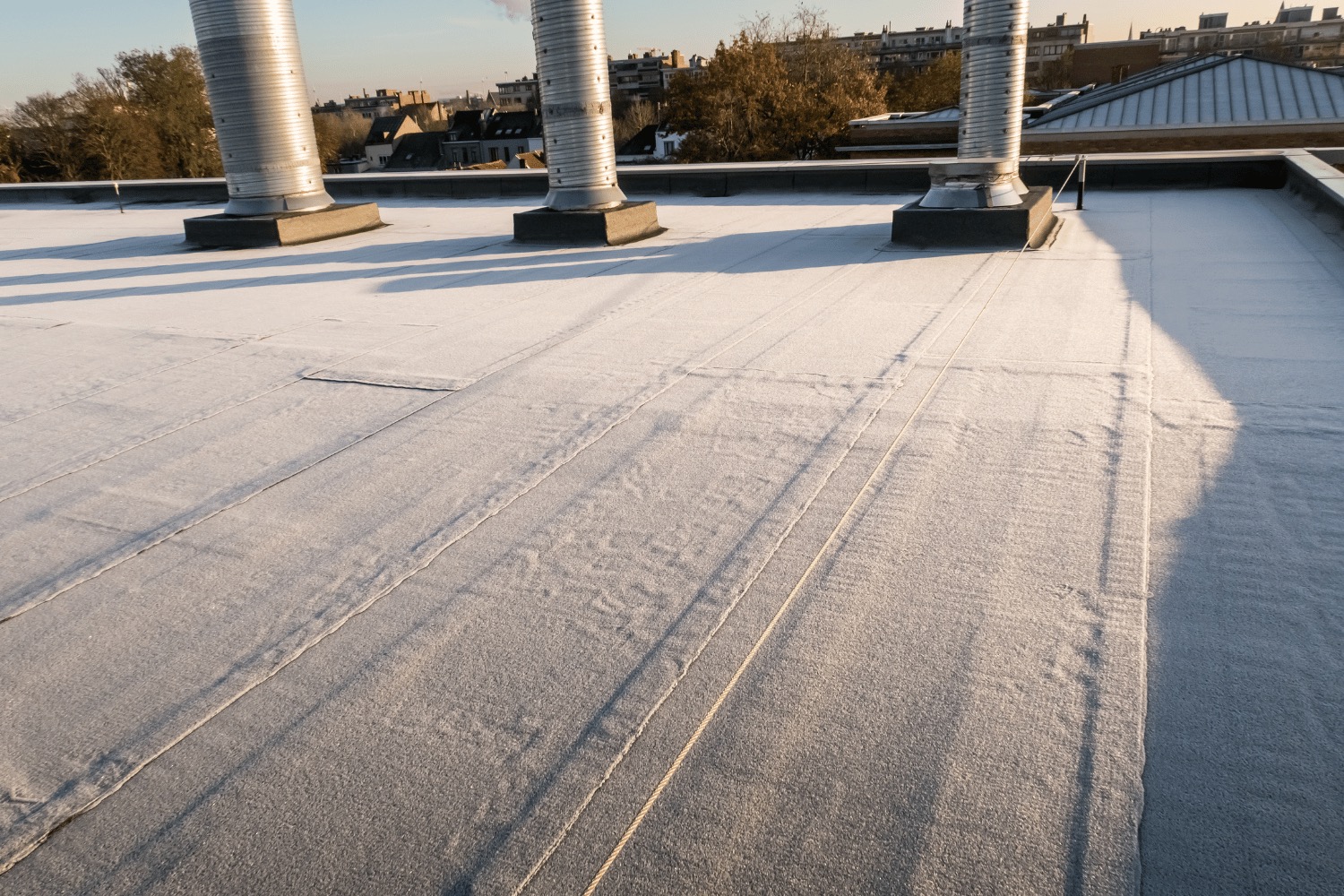
Illustration of PVC roofing for different building types
PVC roofing systems are not a one-size-fits-all solution; they are incredibly adaptable, capable of meeting the specific needs of various building types, including commercial, institutional, and residential structures. The robust nature of PVC roofing, coupled with its minimal maintenance and aesthetic versatility, makes it a fitting choice for a wide range of architectural styles and functional requirements.
Institutional buildings such as schools and hospitals reap the benefits of PVC roofing, thanks to its durability, ease of maintenance, and energy efficiency, which contribute to a safer and more cost-effective environment.
The residential sector is also embracing PVC roofing, particularly for homes with flat or low-slope roofs. Here are some reasons why PVC roofing is becoming popular among homeowners:
- Long lifespan
- Weather resistance
- Reliable
- Stylish
- Energy-efficient
This shift towards PVC roofing demonstrates its growing popularity and its ability to provide homeowners with a reliable, stylish, and energy-efficient roofing solution.
Whether it’s a sprawling commercial complex or a cozy suburban home, PVC roofing can be tailored to meet the demands and enhance the appeal of any building.
Ideal Applications for PVC Roofing Systems
Flat or low-slope roofing structures are where PVC roofing systems truly shine. These roof types, common in commercial settings, are well-suited to the lightweight and versatile nature of PVC membranes. With easy installation and a track record of excellence in performance, PVC roofing is an uncomplicated choice for buildings that need a robust, long-lasting covering. Commercial entities, from condominiums to retail spaces and restaurants, often turn to PVC roofing to take advantage of its benefits, such as energy efficiency and the ability to customize the roof’s appearance to fit the brand or aesthetic of the business.
In addition to its aesthetic appeal, PVC roofing membranes are engineered to excel in low-slope commercial roofing applications where high resistance to fire, chemicals, and extreme wind conditions is a must. This makes PVC an ideal roofing solution for businesses that require additional protection due to their location or the nature of their operations. With PVC, commercial building owners can rest assured that their roof is equipped to handle whatever challenges the environment may present.
Case Studies: PVC Roofing in Action
Real-world applications of PVC roofing provide a window into its versatility and effectiveness in meeting commercial and residential roofing needs. CoMo Premium Exteriors, known for their wide range of roofing services, has a proven track record of delivering high-quality PVC roofing installations that stand the test of time. A notable example includes a large medical facility that benefited from a PVC roofing system, ensuring a durable and weather-resistant solution that can handle the demands of a healthcare environment.
CoMo Premium Exteriors’ expertise is also evident in their work on a high-traffic shopping center, where they implemented a custom-designed PVC roofing solution that enhanced both the roof’s long-term performance and aesthetic appeal. The company’s success in applying PVC roofing to both flat and sloped roofs of commercial buildings, as well as residential homes, highlights the material’s adaptability and the satisfaction it brings to clients, especially regarding its minimal maintenance needs and lifetime performance. These case studies stand as a testament to the ability of PVC roofing to effectively meet a broad spectrum of roofing requirements, making it a smart choice for any building project.
Summary
In conclusion, PVC roofing systems offer an impressive array of advantages for both commercial and residential applications. From their durability and energy efficiency to their weather resistance and low maintenance requirements, PVC roofs stand out as an excellent choice for those seeking a long-term roofing solution. By addressing common misconceptions and comparing PVC to other roofing options, we’ve seen that PVC holds its own as a top contender. The importance of expert installation cannot be overstated, as it ensures the performance and longevity of the roof. With its ability to adapt to different building needs and styles, PVC roofing systems are poised to continue their reign as a preferred roofing option for years to come.
Frequently Asked Questions
How long can a PVC roof last?
A PVC roof can last up to 30 years with proper installation and maintenance, making it a durable and cost-effective choice over time.
Is PVC roofing environmentally friendly?
Yes, PVC roofing is considered environmentally friendly because it is recyclable and can break down into mostly harmless byproducts when combusted efficiently.
Can PVC roofing be used on residential buildings?
Yes, PVC roofing can definitely be used on residential buildings, especially for homes with flat or low-slope roofs, as it offers long lifespan and weather resistance.
How does PVC roofing compare to TPO in terms of chemical resistance?
PVC roofing has superior chemical resistance, making it non-reactive to many chemicals, while TPO may suffer negative effects when in contact with oils and certain exhausts. Therefore, PVC roofing is preferable in terms of chemical resistance.
What are the maintenance requirements for a PVC roof?
PVC roofs require minimal maintenance, including routine inspections and occasional cleaning to ensure cost-effectiveness for property owners. Prompt repairs of any issues are also necessary.

